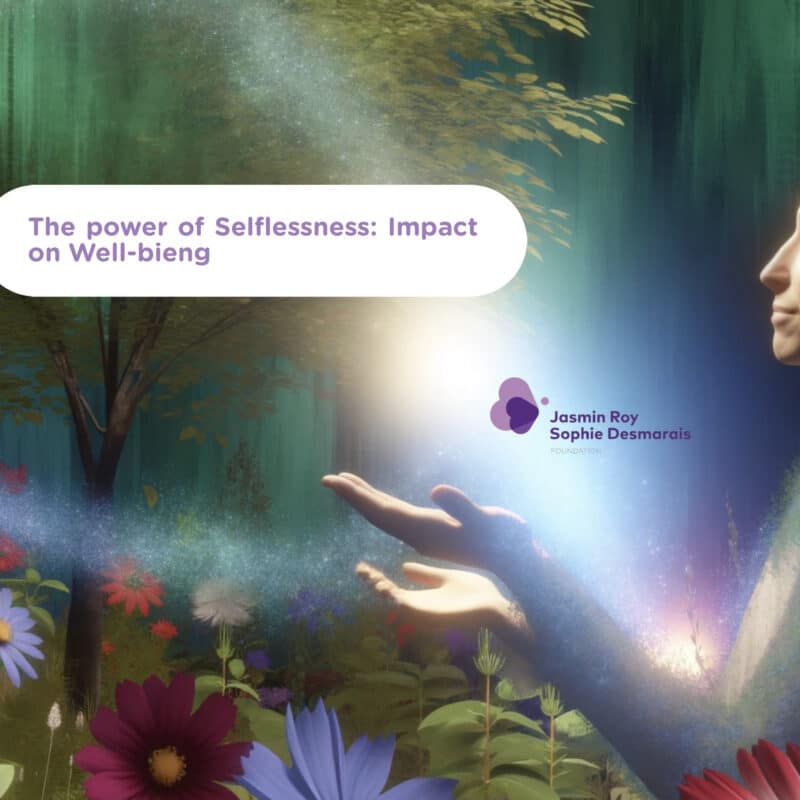Selflessness involves offering time, skills, or resources to help others without expecting anything in return. This form of altruism can take many forms, from volunteering for charitable causes to attentively listening to a friend in distress. The power of selflessness lies in its ability to enhance our mental and emotional well-being in several ways.
Strengthening social bonds: Selflessness fosters the creation of strong social ties. By actively engaging in volunteer activities or supporting friends and loved ones, we connect with others who share similar values. These positive relationships contribute to our sense of belonging and social support, essential for our emotional well-being.
Increasing gratitude: By giving our time and energy to others, we better appreciate what we have in our lives. Gratitude is a decisive factor in well-being, as it allows us to focus on the positive aspects of our existence.
Boosting self-esteem: Selflessness can enhance our self-esteem by making us feel useful and valuable. Realizing that our actions positively impact others’ lives reinforces our self-confidence and personal worth.
Reducing stress and anxiety: Engaging in selflessness can reduce stress and anxiety by allowing us to put our problems into perspective. By focusing on others’ needs, we can often forget our own temporary concerns and experience stress relief.
Heightened sense of purpose and satisfaction: Selflessness can increase our understanding of purpose. When we contribute to improving others’ lives or addressing social issues, we experience a profound sense of satisfaction and personal fulfillment.
Benefits of selflessness: inspiring examples
Oprah Winfrey is one of the most inspiring examples of the power of selflessness. She is globally recognized for her philanthropic efforts and constant desire to help others. Oprah has created numerous charitable initiatives, including the Oprah Winfrey Leadership Academy for Girls in South Africa, which provides quality education to underprivileged young girls. Her commitment to selflessness has not only changed the lives of thousands of people but has also brought her a deep sense of satisfaction and fulfillment in her charitable work.
Dr. Bruce D. Perry, a renowned psychiatrist specializing in resilience, is another example of how selflessness can have a transformative impact. His work involves helping traumatized children and families recover through therapeutic interventions. Dr. Perry devotes his life to understanding and mitigating the effects of stress and trauma on child development. His commitment to this cause has not only helped countless individuals but has also contributed to advancing research in this crucial field.
When selflessness is beneficial
Selflessness is beneficial in many situations, but practicing it in a balanced way is essential to avoid exhaustion and emotional overload. Here are some instances where selflessness can be particularly beneficial:
Supporting loved ones: Being there for family and friends in times of need is a precious act of selflessness. Listening, providing emotional support, and offering practical assistance are all ways to comfort our loved ones.
Volunteering: Engaging in volunteer activities within our community or for charitable organizations is an excellent way to give our time and skills while positively contributing to society.
Mentoring: Mentoring involves guiding and supporting someone less experienced in developing their skills or career. It’s an excellent opportunity to share knowledge and experience.
Financial giving: Financial giving can support causes close to our hearts. Choosing reliable and transparent organizations is essential to ensure funds are used effectively.
When selflessness is not beneficial
While selflessness can be extremely rewarding, there are times when it can be harmful to our well-being. Here are some situations to consider:
Burnout: If we become too deeply involved in selflessness, we risk emotional and physical exhaustion. It’s essential to recognize our limits and take time for ourselves.
Lack of boundaries: Failing to establish clear boundaries in our acts of selflessness can lead to emotional overload.
Self-neglect: Selflessness should not mean neglecting ourselves. Taking care of our well-being is essential to help others effectively.
Therefore:
Know your limits: Be aware of your own emotional and physical limits. Only commit to what you can realistically achieve.
Establish boundaries: Set clear boundaries in your acts of selflessness. Learn to say no when necessary to preserve your well-being.
Take care of yourself: Don’t neglect your well-being. Take time to relax, recharge, and care for your physical and mental health.
Be selective: Choose causes and activities that genuinely resonate with you. You’ll be more motivated and satisfied when working for causes you’re passionate about.
Selflessness is a powerful act that can enrich our lives in many ways. Committing to helping others strengthens our social bonds, develops gratitude, boosts self-esteem, reduces stress, and increases the sense of purpose and satisfaction. However, it’s essential to practice selflessness in a balanced manner, knowing our limits, establishing boundaries, and taking care of our well-being.
Inspiring figures like Oprah Winfrey and Dr. Bruce D. Perry show us that selflessness can transform our lives and those of others. By following the above advice, we can engage in selflessness in a fulfilling and beneficial way, creating a better world for all.





